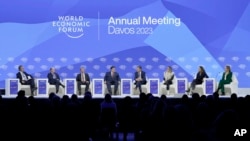This year, participants are meeting to tackle problems such as the climate crisis, how to prevent a global recession, the energy crunch and the impending first year anniversary of the war in Ukraine.
John Kwabena Kwakye, director of research at the Institute of Economic Affairs Ghana, told VOA that it seems the WEF is in touch with current realities.
"It is the right forum — a relevant venue outside of those like the G20, the World Bank, the International Monetary Fund and the World Trade Organization — to tackle some of the pressing challenges facing the global community today," he said.
However, he said, "the interests of poor countries are sometimes swept under the carpet and are never given enough attention. The forum must bring more attention to what is the common global interest: the widening gap between the rich and the poor, south and the north."
A report by the nonprofit Oxfam published this week highlighted wealth disparities as inflation pounds consumers around the world.
The report noted that hikes in food prices and energy bills continue to enrich the world's billionaires while at least 1.7 billion workers now live in countries where inflation is outpacing wages.
Kwakye said the WEF can rise up to meet the moment if it works to tackle the issues raised in the Oxfam report.
"If the forum pays attention to the Oxfam report, then of course I can see that the forum has much relevance as far as developing countries' interests are concerned," he said.
"I want to see some focus on how the rest of the world especially the advanced ones can lift developing countries from their current levels of development, very low levels of poverty up to a reasonable standard of living (within) a reasonable timeframe."
"There should be financing, investments, more trade to help developing countries because they're falling behind the rest of the world," he added.
Edwin Truman, senior fellow at Harvard Kennedy School’s Mossavar-Rahmani Center for Business and Government, told VOA that although the forum isn't a decision making body, it purports to help shape opinions around the world, adding that "the real question is if they themselves take anything away from the discussion."
"I think that the forum has never had a huge impact. Its largest impact is when a leader of a country comes to the forum and makes a significant statement. Either a clear articulation of his or her policies or change in policies and that brings (their) country more attention, so it is useful in that sense," he said.
Truman said despite the uncertainty with the war in Ukraine and inflation, it appears advanced economies are likely to have a better year than was feared a few months ago, while admitting the weakened economic positions of developing countries.
"For example, Europe will get through the winter without a major energy crisis, the United States' economy has been performing better and the Chinese economy will be back to a more normal after COVID, which provides a lot of strength to the global economy, both on the demand and supply side," Truman said.
Founded in 1971, the forum offers policy makers and top executives, mainly from Europe, the opportunity to respond to global challenges.
Some information was sourced from Reuters.
